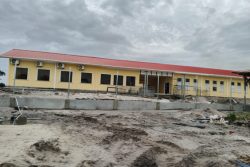The justice that terrorists love
I suppose it’s somewhat natural that those of us past seventy, eighty will frequently recall the days of our youth.
I grew up with a grandmother in Alberttown, Georgetown and was often exposed to the then old folks’ banter, expressions, wisdom, misinformation and misinterpretations. All rendered in rich colourful creole. Many Fentys were in the old police force. And as a young primary school teacher I was fascinated to learn that our present-day police force is one of the very earliest/oldest institutions in the country.
It was established way back in 1839 just after Emancipation. After all, any feisty former (now free) slaves had to be kept in their places. A civil, not-too-military active body had to enforce society’s laws, rules, regulations.
As I enjoyed my poor youth of the fifties and very early sixties in urban Guyana crime was not as common-place, varied and vicious as in these relatively dangerous days. Yet my old-folks fully appreciated and respected the vital law-and-order role of our police force – the country’s front-line law-enforcement and security officers employed by the state.
Thus the old folk’s expression “After God is Police”. Meaning that though the almighty is the Supreme Power, on earth and in our communities when bad people attack innocent citizens it is the police who were/are on hand to investigate and to apprehend quickly those wrong-doers. Indeed old folks, during some robbery or attack, would scream out: “Oh God! Police! Thief! Police”.)
****
Our Police Force today
All the above remarks were prompted by two very recent presentations. Just hours apart I read a long letter by attorney-at-law K. Juman-Yassin regarding (spiralling) crime in the country, only to be followed by a government DPI feature on all the plans in train to refashion and “revamp” the Guyana Police Force. I was thus motivated to pen these very brief thoughts under the caption I first used years ago. Mainly for its creolese colour.
Indeed our 182-year old GPF has had a colourful history – from Dutch-type Burgher Militias to police settlements near half-free slaves locations in 1834 to town councils to replace Boards of Police; High Sheriffs and so on to the 1839 “modern” Police Force.
But where are we today? Fifty-five years after Independence? Frankly speaking, I submit that, unfortunately, our GPF is reflective of the stagnant, somewhat regressive nature of our overall natural development. Commissions of Inquiry, strategic plans all prescribed improvements but the politics of priorities get in the way.
Just a few days ago, once again, President Ali outlined on-going plans to “revamp” the force -additional facilities and transportation; forensic training; correcting deficiencies identified in a 2017 reform study; scholarships for police in “novel areas”; body cameras; huge budget 2021; personal welfare improvement programmes; community police and private sector support.
“Impressive”- as usual. But added to Mr Juman-Yassin’s excellent proposals, I offer these basic, practical, man-in-the-street suggestions: improved salaries/ incentives for GPF members; village stations outposts in the heart of communities; patrols by night where gangs congregate – from Corentyne to Black Bush to Parika to Ann’s Grove to Agricola and Anna Regina; computer maps of communities in all stations; drones to scrutinise mining/hinterland communities. What are your ideas?
****
Small parties, “cardboard” parties
By “parties” I mean political representative entities with some structure and actual verifiable constituencies – whether fully-paid-up members or just loyal supporters.
In many societies there are a few almost traditional political parties – veritable behemoths, usually two. But there can be (newer) smaller political groups who capture the electorate’s fancy from time to time. They even become crucial when the “big ones” need to coalesce to command majorities. What about Guyana? We had briefly the UF, the WPA and the AFC to “challenge” our PPP and PNC. Where are they now? What does “power-sharing” do to them?
Next Friday I’ll list for you-all some 20/30 small “parties” our grand-parents enjoyed. But many were merely ambitious, power-seeking “cardboard parties”! As described by the PNC Brigadier leader last year August-September.
****
Justice enjoyed by terrorists
Do you realise that too often when ordinary “non-legal” persons call out for justice, they really are demanding some decision that pleases or rewards them – no matter what the evidence and circumstances are.
But true justice is really defined as the administration of what is just when assigning rewards or punishment; fairness in administering laws, rules and regulations. Justice from courts-of-law is not meant for only those who clamour for such.
This thought was triggered by the fact that, after 20 years, five accused terrorists in the New York Twin Towers aeroplane bombing which killed nearly 3000 and maimed thousands more, only just had their cases called.
They were incarcerated in the American facility in Cuba. Legal technicalities and procedures and legal representation had to be provided by the Americans! Any terrorist would love American justice not available at all in their own country, right?
****
Ponder well…
● 1) Please assist me: I never heard the PNC leader Brig. Granger himself call the government “illegitimate” But his younger comrades and the misled describe the government as “installed”.
So is the parliamentary opposition also installed?
● 2) Smart-bomb wars today. If a bomb kills civilians and not only the target, is that wrong these days?
● 3) The letter-writer wondered: if hundreds arrive at CJIA after 11 pm, they’re breaking the curfew?
`Til next week!







